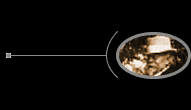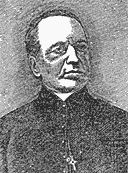


 |
  |
|
 Father Peter Pernin, about 1874 |
A COUNTRY COVERED with dense forests, in the midst of which are to be met with here and there, along newly opened roads, clearings of more or less extent, sometimes a half league in width to afford space for an infant town, or perhaps three or four acres intended for a farm. With the exception of these isolated spots where the trees have been cut down and burned, all is a wild but majestic forest. Trees, trees everywhere, nothing else but trees as far as you can travel from the bay, either towards the north or west. These immense forests are bounded on the east by Green Bay of Lake Michigan, and by the lake itself. The face of the country is in general undulating, diversified by valleys overgrown with cedars and spruce trees, sandy hills covered with evergreens, and large tracts of rich land filled with the different varieties of hard wood, oak, maple, beech, ash, elm, and birch. The climate of this region is generally uniform and favorable to the crops that are now tried there with remarkable success. Rains are frequent, and they generally fall at a favorable time. The year 1871 was, however, distinguished by its unusual dryness. Farmers had profited of the latter circumstance to enlarge their clearings, cutting down and burning the wood that stood in their way. Hundreds of laborers employed in the construction of a railroad had acted in like manner, availing themselves of both axe and fire to advance their work. Hunters and Indians scour these forests continually, especially in the autumn season, at which time they ascend the streams for trout-fishing, or disperse through the woods deer-stalking. At night they kindle a large fire wherever they may chance to halt, prepare their suppers, then wrapping themselves in their blankets, sleep peacefully, extended on the earth, knowing that the fire will keep at a distance any wild animals that may happen to range through the vicinity during the night. The ensuing morning they depart without taking the precaution of extinguishing the smouldering embers of the fire that has protected and warmed them. Farmers and others act in a similar manner. In this way the woods, particularly in the fall, are gleaming everywhere with fires lighted by man, and which, fed on every side by dry leaves and branches, spread more or less. If fanned by a brisk gale of wind they are liable to assume most formidable proportions. Twice or thrice before October 8, the effects of the wind, favored by the general dryness, had filled the inhabitants of the environs with consternation. A few details on this point may interest the reader, and serve at the same time to illustrate more fully the great catastrophe which overwhelmed us later. The destructive element seemed whilst multiplying its warning to be at the same time essaying its own strength. On September 22 I was summoned, in the exercise of my ministry, to the Sugar Bush,1 a place in the neighborhood of Peshtigo, where a number of farms lie adjacent to each other. Whilst waiting at one of these, isolated from the rest, I took a gun, and, accompanied by a lad of twelve years of age, who offered to guide me through the wood, started in pursuit of some of the pheasants which abounded in the environs. At the expiration of a few hours, seeing that the sun was sinking in the horizon, I bade the child reconduct me to the farmhouse. He endeavored to do so but without success. We went on and on, now turning to the right, now to the left, but without coming in view of our destination. In less than a half hour's wanderings we perceived that we were completely lost in the woods. Night was setting in, and nature was silently preparing for the season of rest. The only sounds audible were the crackling of a tiny tongue of fire that ran along the ground, in and out, among the trunks of the trees, leaving them unscathed but devouring the dry leaves that came in its way, and the swaying of the upper branches of the trees announcing that the wind was rising. We shouted loudly, but without evoking any reply. I then fired off my gun several times as tokens of distress. Finally a distant halloo reached our ears, then another, then several coming from different directions. Rendered anxious by our prolonged absence, the parents of my companion and the farm servants had finally suspected the truth and set out to seek us. Directed to our quarter by our shouts and the firing, they were soon on the right road when a new obstacle presented itself. Fanned by the wind, the tiny flames previously mentioned had united and spread over a considerable surface. We thus found ourselves in the center of a circle of fire extending or narrowing, more or less, around us. We could not reach the men who had come to our assistance, nor could we go to them without incurring the risk of seriously scorching our feet or of being suffocated by the smoke. They were obliged to fray a passage for us by beating the fire with branches of trees at one particular point, thus momentarily staying its progress whilst we rapidly made our escape. The danger proved more imminent in places exposed to the wind, and I learned the following day, on my return to Peshtigo, that the town had been in great peril at the very time that I had lost myself in the woods. The wind had risen, and, fanning the flames, had driven them in the direction of the houses. Hogsheads of water were placed at intervals all round the town, ready for any emergency. I will now mention another incident that happened a few days before the great catastrophe: I was driving homeward after having visited my second parish situated on the banks of the River Menominee, about two leagues distant.2 Whilst quietly following the public road opened through the forest, I remarked little fires gleaming here and there along the route, sometimes on one side, sometimes on the other. Suddenly I arrived at a spot where the flames were burning on both sides at once with more violence than elsewhere. The smoke, driven to the front, filled the road and obscured it to such a degree that I could neither see the extent of the fire nor judge of the amount of danger. I inferred, however, that the latter was not very great as the wind was not against me. I entered then, though at first hesitatingly, into the dense cloud of smoke left darkling behind by the flames burning fiercely forward. My horse hung back, but I finally succeeded in urging him on, and in five or six minutes we emerged safely from this labyrinth of fire and smoke. Here we found ourselves confronted by a dozen vehicles arrested in their course by the conflagration. "Can we pass?" inquired one. "Yes, since I have just done so, but loosen your reins and urge on your horse or you may be suffocated." Some of the number dashed forward, others had not the hardihood to follow, and consequently returned to Peshtigo. |
1 There were three of these farming communities: the Lower Sugar Bush, comprising settlements extending for about seven miles west of Peshtigo on the road leading to Oconto; the Middle Sugar Bush, made up of settlements along a road running to the southwest; and the Upper Sugar Bush, containing settlements along what was known as the Lake Noquebay Road. In all, they consisted of about 300 families. Frank Tilton, Sketch of the Great Fires in Wisconsin at Peshtigo, the Sugar Bush, Menekaune, Williamsonville . . . (Green Bay, 1871), 7.
2 A league varies from about 2.4 miles to 4.6 statute miles, depending on the nation involved. Pernin was probably using the English league which is about 3 miles, since Peshtigo is about seven miles from Marinette.